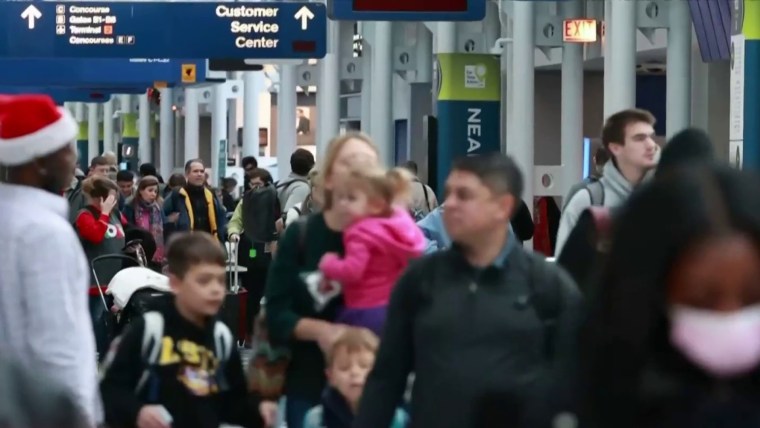
The deadly winter storm that has killed at least 30 people and caused travel chaos across the U.S. will create a “potentially life-threatening hazard” for those on the move or working outside on Christmas Day, forecasters warned Sunday.
“In some areas, being outdoors could lead to frostbite in minutes,” the National Weather Service said in a bulletin.
“If you must travel or be out in the elements, prepare for extreme cold by dressing in layers, covering as much exposed areas of skin as possible and pack winter safety kits in your vehicles,” it said.
Stretching from the Great Lakes near Canada to the Rio Grande along the Mexican border, the storm swept across the U.S. in recent days, leaving at least 30 people dead, according to an NBC News tally.
Fatalities were recorded in 11 states as of Sunday afternoon: Colorado, Kansas, Kentucky, Michigan, Missouri, Nebraska, New York, Ohio, Oklahoma, Tennessee and Wisconsin.
Four people died Saturday in a three-vehicle crash on an interstate highway in Ohio and at least three people died in the Buffalo area, including two who suffered medical emergencies in their homes and could not be saved because emergency crews were unable to reach them amid historic blizzard conditions.
New York Gov. Kathy Hochul said Friday almost every fire truck in the city was stranded in the snow, and she asked residents to “bundle up, stay indoors and stay safe this weekend.”
The city’s international airport was also shut down.
Blinding blizzards, freezing rain and frigid cold also knocked out power in places from Maine to Seattle, leaving hundreds of thousands of homes and businesses without power and millions of people on edge about the possibility of blackouts.
The start of the NFL’s Tennessee Titans’ game in Nashville was delayed an hour by a planned power outage.
Power was being restored but by early Christmas morning, more than 250,000 homes remained without electricity, including almost 100,000 across Maine, according to the Poweroutage.us website.
National Grid, which services customers in New York and Massachusetts, asked its customers on Saturday in Brooklyn, Queens, Staten Island and Long Island to reduce natural gas usage until Sunday afternoon.
Thousands of flights were also canceled as people tried to make their way home for Christmas. On Sunday, at least 1,200 flights were canceled across the country, stranding last-minute holiday travelers.
Increasing snowfall can be attributed in part to climate change, according to the Environmental Defense Fund, an environmental advocacy group, as “a warmer planet is evaporating more water into the atmosphere.”
“That added moisture means more precipitation in the form of heavy snowfall or downpours,” it said on its website.
“During warmer months, this can cause record-breaking floods. But during the winter — when our part of the world is tipped away from the sun — temperatures drop, and instead of downpours we can get massive winter storms,” it said.
Meanwhile, the National Weather Service said the conditions were “expected to slowly improve as the system weakens.” But for Sunday it said blustery winds would “continue to filter in cold Canadian air to the eastern two-thirds of the nation.”
It said that “heavy lake effect snow, strong winds, and reduced visibilities” would continue downwind of the Great Lakes and “bitter conditions” would remain across much of the country.
“Lake-effect snows with local blizzard conditions may linger into Christmas Day,” it said.
Daniel Arkin and The Associated Press contributed.

 Latest Breaking News Online News Portal
Latest Breaking News Online News Portal





